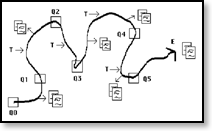Losing the ability to read
07/07/10 11:14 Filed in: reading
For those
of you who have access to the New Yorker, there is a
great article by Oliver Sacks on people who have lost
the ability to read after a stroke. They can still
write, but they cannot go back and read their own
writing. I wish the entire piece was available
online, but there is an abstract, and hopefully if
you are interested, you can chase it down at the
library. It's subscription only for the full article.
(So really, subscribe to the New Yorker, what else
can I say? So many good articles in it.) But back to
this one: It's fascinating, as is much of what Oliver
Sacks writes:
Whatever language a person is reading, the same area of inferotemporal cortex, the visual word form area, is activated. Why should all human beings have this built-in facility for reading when writing is a relatively recent cultural invention? ... Writing, a cultural tool, has evolved to make use of the inferotemporal neurons’ preference for certain shapes. The origin of writing and reading cannot be understood as a direct evolutionary adaptation. It is dependent on the plasticity of the brain, and on the fact that experience is as powerful an agent of change as natural selection. We are literate not by virtue of a divine intervention but through a cultural invention and a cultural selection that make a creative new use of a preëxisting neural proclivity.
Harold Engel, the patient who presented himself to Sacks after losing his ability to read, had been a novelist, and wrote mysteries. The story of how he worked to start writing again, without being able to edit or revise his drafts directly, is amazing - dictation and audio recordings and having someone read his drafts to him had to take the place of him being able to reread what he had written.
Read more: http://www.newyorker.com/reporting/2010/06/28/100628fa_fact_sacks#i...
Whatever language a person is reading, the same area of inferotemporal cortex, the visual word form area, is activated. Why should all human beings have this built-in facility for reading when writing is a relatively recent cultural invention? ... Writing, a cultural tool, has evolved to make use of the inferotemporal neurons’ preference for certain shapes. The origin of writing and reading cannot be understood as a direct evolutionary adaptation. It is dependent on the plasticity of the brain, and on the fact that experience is as powerful an agent of change as natural selection. We are literate not by virtue of a divine intervention but through a cultural invention and a cultural selection that make a creative new use of a preëxisting neural proclivity.
Harold Engel, the patient who presented himself to Sacks after losing his ability to read, had been a novelist, and wrote mysteries. The story of how he worked to start writing again, without being able to edit or revise his drafts directly, is amazing - dictation and audio recordings and having someone read his drafts to him had to take the place of him being able to reread what he had written.
Read more: http://www.newyorker.com/reporting/2010/06/28/100628fa_fact_sacks#i...
People are just like bears - information foraging
07/06/10 11:13 Filed in: search

Marcia Bates' berrypicking model
In her landmark 1989 paper, www.gseis.ucla.edu/faculty/bates/berrypicking.html?referer=http%3A%..., Marcia Bates outlined search as an evolutionary process. Users often begin with a general query, glean a few nuggets from the initial results, reformulate their query based on that new knowledge, and then repeat this process. Like a bear foraging for food in the forest, knowledge seekers tend to rapidly migrate from one patch of information to the next.
While this iterative behavior is true of virtually everyone using search, there are two key factors that distinguish some users from others: domain expertise and search expertise(though www.boxesandarrows.com/view/search-behavior?referer=http%3A%2F%2Ftw..., John Ferrara has identified several additional factors). Some websites, for example, may be able to assume that users are highly literate in a specific topic, while other websites may need to design for a range of expertise in a variety of subjects (the case for web search engines). In addition, users experienced at using search interfaces will be more capable of utilizing sophisticated search tools, but less experienced users will demand less complexity.
Keep reading here